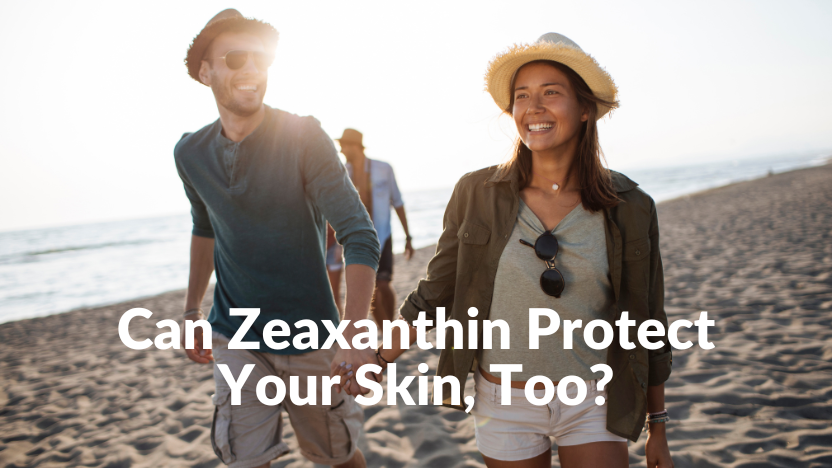Can Zeaxanthin Help Protect Skin?
Posted by EyePromise on Jun 16th 2022
Zeaxanthin (zee-uh-zan-thin) is a powerful antioxidant found throughout nature. It’s a well-known component in healthy eyes, supporting and building a healthy macular pigment. Macular pigment is a protective layer in the eye that absorbs harmful light that can damage the sensitive cells in the retina. Zeaxanthin is often referred to as a pigment, and it’s protective qualities have been show to benefits our skin, too.
What Is Zeaxanthin?

Classified as a xanthophyll (zan-tho-fill), zeaxanthin is also known as a carotenoid or an antioxidant because of its protective properties. It’s an orange-red pigment found in brightly colored fruits and vegetables like orange bell peppers, paprika peppers, and corn. The more we ingest, the more it builds up in our bodies and the greater its protection. Specifically, zeaxanthin absorbs harmful light that can cause oxidative damage within cells throughout the body.
Zeaxanthin and the Skin
Besides being found in the eyes, zeaxanthin is also found in the brain, blood serum, and skin. The skin is the largest organ in the body and play an important role in immunity, body temperature regulation, and our sense of touch. As the most exposed organ, our skin is subject to repetitive assaults, especially during the summer.
With temperatures warming up people want to wear shorts and sleeveless shirts, leaving the skin even more exposed to damaging light. In fact, 50% of the oxidative damage that occurs to skin is caused by visible light produced by the sun. That’s why it’s important to protect the skin with long sleeves, sun shirts, sunscreen, and/or zeaxanthin intake.
Benefits of Zeaxanthin for the Skin
Zeaxanthin has been demonstrated to have several benefits for the skin. One study found that it may inhibit certain lipid oxidation and provide protection against high-energy light sources that can damage skin cells. Another study linked higher zeaxanthin levels to reduced light-induced skin damage, especially from ultraviolet (UV) wavelengths. Another study showed that zeaxanthin can soothe irritation caused by UV rays.
Beyond protective properties, zeaxanthin intake, specifically supplementation with dietary zeaxanthin and its counterpart lutein, was shown to:
- Improve skin hydration
- Hydration improvements seen at 2, 6, and 8 weeks within the study period
- Reduce wrinkle severity and count
- Improve skin tone and elasticity
- Potential side benefit: zeaxanthin pigmentation may help you tan faster and keep it longer!
EyePromise Vitamins
EyePromise, the #1 eye doctor-recommended eye vitamin brand, is the only line of clinically proven vitamins with the amount of dietary zeaxanthin necessary to increase levels of zeaxanthin throughout the body. It’s important that you get dietary zeaxanthin because it’s the only type of zeaxanthin found in all parts of the body (brain, eyes, skin, and blood). EyePromise formulas have consistently proven to absorb well and deliver the critical nutrients to all the places you need them most.
Summertime is a time of fun in the sun, but all that exposure puts your skin and eyes at risk for oxidative damage. Protect them both by taking an EyePromise vitamin daily! Learn more about EyePromise eye vitamins, and start protecting your skin and eyes today!
Sources
- Juturu, Vijaya et al. “Overall skin tone and skin-lightening-improving effects with oral supplementation of lutein and zeaxanthin isomers: a double-blind, placebo-controlled clinical trial.” Clinical, cosmetic and investigational dermatology vol. 9 325-332. 7 Oct. 2016, doi:10.2147/CCID.S115519
- Roberts RL, Green J, Lewis B. Lutein and zeaxanthin in eye and skin health. Clin Dermatol. 2009 Mar-Apr;27(2):195-201. doi: 10.1016/j.clindermatol.2008.01.011. PMID: 19168000.
- Schwartz S, Frank E, Gierhart D, Simpson P, Frumento R. Zeaxanthin-based dietary supplement and topical serum improve hydration and reduce wrinkle count in female subjects. J Cosmet Dermatol. 2016 Dec;15(4):e13-e20. doi: 10.1111/jocd.12226. Epub 2016 Jun 17. PMID: 27312122.


